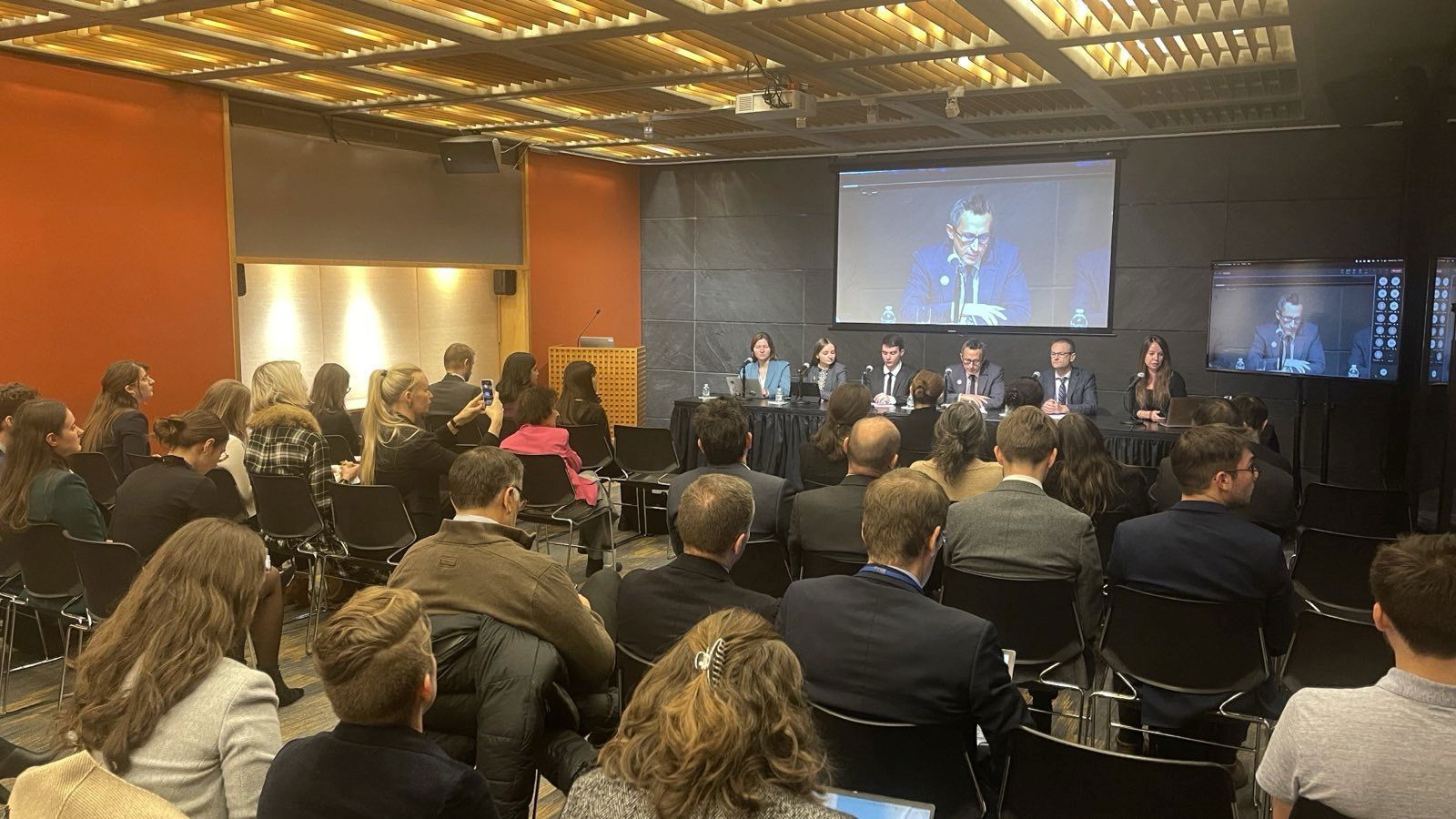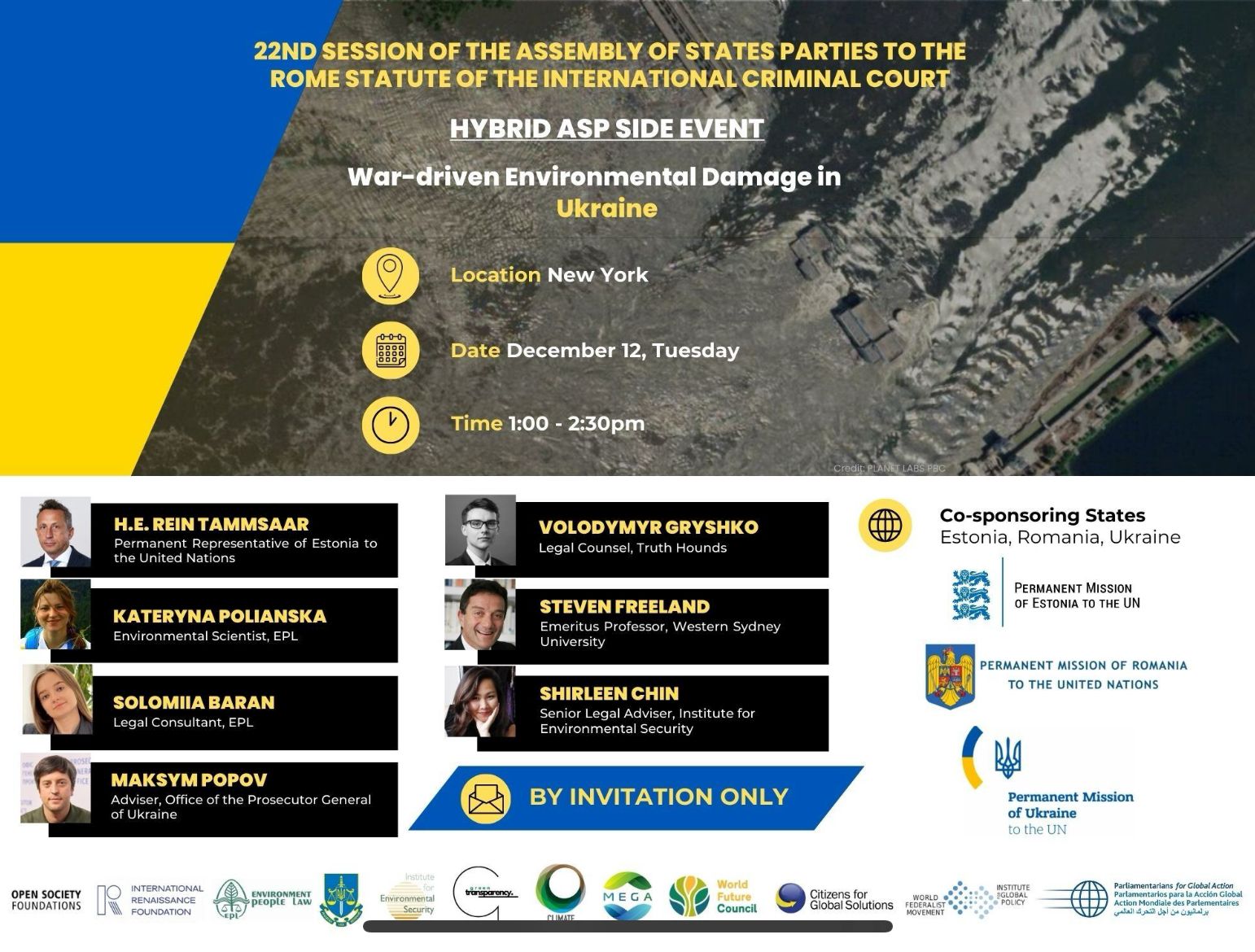Powerful call to action by Ukraine and members of civil society for the International Criminal Court to address ‘ecocide’

By Shirleen Chin, Senior Legal Adviser, IES
New York, 13 December 2023 (Updated 21 October 2024)
IES co-organised an official side event addressing “ecocide” of Russia’s aggression in Ukraine in conjunction with the 22nd Session of the Assembly of States Parties to the Rome Statute of the International Criminal Court on12 December 2023, New York City.
Mounting evidence of environmental devastation caused by Russia's aggression in Ukraine is prompting calls for the International Criminal Court (ICC) to expand its investigations to include the crime of ecocide.
Held in conjunction with the 22nd Session of the Assembly of States Parties to the Rome Statute, a December 12th side event underscored the urgency for accountability. The event, co-sponsored by Ukraine, Estonia, and Romania and an impressive list of co-organisers, [1] brought together environmental experts and legal authorities to discuss the widespread environmental damage inflicted during the war.
A key focus was the destruction of the Kakhovka Dam on June 6th, 2023, caused by the Russian Federation. The destruction of the dam caused floods in the area, and a large-scale humanitarian and environmental crisis. This act, according to Maksym Popov, Environmental Adviser to the Office of the Prosecutor General of Ukraine (the Office), is currently being investigated by the Office but is not without its own hurdles. Issues of access to the site, resources and expertise are just a few of the challenges Ukraine faces due to the ongoing nature of the conflict. In addition, the ICC has not considered looking into this provision when investigating the situation in Ukraine. As a matter of fact, the court lacks a precedent on Article 8(2)(b)(iv) despite clear cases past and present of significant environmental damage during war.

Environmental Scientist Kateryna Polianska of Environment-People-Law (EPL) highlighted the devastating impact of the war on Ukraine's ecosystems. Scientific expeditions have documented the destruction caused by the Kakhovka Dam incident, and EPL is calling for international cooperation to facilitate restoration efforts.
Legal Consultant for EPL, Solomiia Baran, emphasized the urgent need for international support to assist Ukraine in its domestic investigations of ecocide given the difficulties related to accessibility during the conflict. Popov echoed this sentiment, expressing the Office's openness to collaboration in finding solutions and strengthening environmental protections.
Professor Steven Freeland of Western Sydney University pointed out that the current threshold for environmental damage under the Rome Statute may be too high. Freeland argued for a revision of Article 8(2)(b)(iv) to enable more effective investigations and prosecutions.
The human cost of the environmental damage was also addressed. Volodymyr Hryshko of Truth Hounds spoke of the loss of drinking water and potential radiation exposure faced by Ukrainian civilians.
Shirleen Chin, Senior Legal Adviser of the Institute for Environmental Security, applauded Ukraine's leadership in pursuing ecocide charges. Chin emphasized the need for developments in both national and international law to solidify ecocide as a standalone crime in the Rome Statute.
It is clear from this side event that civil society and Ukrainian law enforcement are taking a strong stance against war-driven environmental destruction. The ICC, a beacon of international criminal justice, must now demonstrate its commitment to holding perpetrators accountable for all war crimes, including ecocide.
Examining War-driven Damage to the Environment in Ukraine
The Environmental Justice Project proposes a test case in the form of a mock trial examining the application of, amongst others, Article 8(2)(b)(iv) of the Rome Statute, encompassing acts causing ‘widespread, long-term and severe damage to the natural environment'. The mock trial will focus on the destruction of Kakhovka Dam on 6 June 2023 as a test case application of the relevant provisions under Article 8.
As described in the concept note [2] put forward by the Environmental Justice project the main goals of the mock trial include a call to action for the International Criminal Court, in particular to open a preliminary investigation into large-scale environmental harm of the Kakhovka Dam as a war crime and to consider the possible amendment of Article 8(2)(b)(iv) of the Rome Statute.
Coalition partners include the Office of the Prosecutor General of Ukraine, a number of Ukrainian NGOs and a list of international NGOs.
[1] Open Society Foundations, Office of the Prosecutor General of Ukraine, International Renaissance Foundation, Environment-People-Law, Institute for Environmental Security, Green Transparency, Parliamentarians for Global Action, World Federalist Movement, Citizens for Global Solutions, World Future Council, Climate Governance Commission, Mobilising an Earth Governance Alliance
[2] See Concept Note: Test Case Examining War-driven Damage to the Environment in Ukraine
For Further Reading (Updated 21 October 2024)
Leal Filho, W., Eustachio, J. H., Fedoruk, M., & Lisovska, T. (19 July 2024). War in Ukraine: An overview of environmental impacts and consequences for human health. Frontiers in Sustainable Resource Management, 3, 1423444. https://doi.org/10.3389/fsrma.2024.1423444
The environmental consequences of the war against Ukraine: Preliminary 12-month assessment, summary and recommendations, Conflict and Environment Observatory, March 2024 https://ceobs.org/the-environmental-consequences-of-the-war-against-ukraine-preliminary-12-month-assessment-summary-and-recommendations/
Assessing environmental damage in Ukraine, Conflict and Environment Observatory, February 2024 https://ceobs.org/paper-assessing-environmental-damage-in-ukraine/
Gabija Leclerc, M, Russia's war on Ukraine: High environmental toll, EPRS | European Parliamentary Research Service, July 2023 https://www.europarl.europa.eu/RegData/etudes/ATAG/2023/751427/EPRS_ATA(2023)751427_EN.pdf
Extract: There is currently no global legal instrument on ecocide, but along with the core principles of international humanitarian law (distinction, military necessity and proportionality), several international law provisions address environmental protection in wartime. For instance, while the International Criminal Court (ICC) does not recognise ecocide as a 'core crime' – the gravest type of crime – Article 8(2)(b)(iv) of its Rome Statute lists acts of 'intentionally launching an attack in the knowledge that such attack will cause ... widespread, long-term and severe damage to the natural environment, which would be clearly excessive in relation to the concrete and direct overall military advantage anticipated' as war crimes. … Some therefore advocate for i) strengthening current provisions on environmental protection in war; ii) making ecocide the fifth international crime under the ICC list; or iii) drafting a new convention on ecocide.